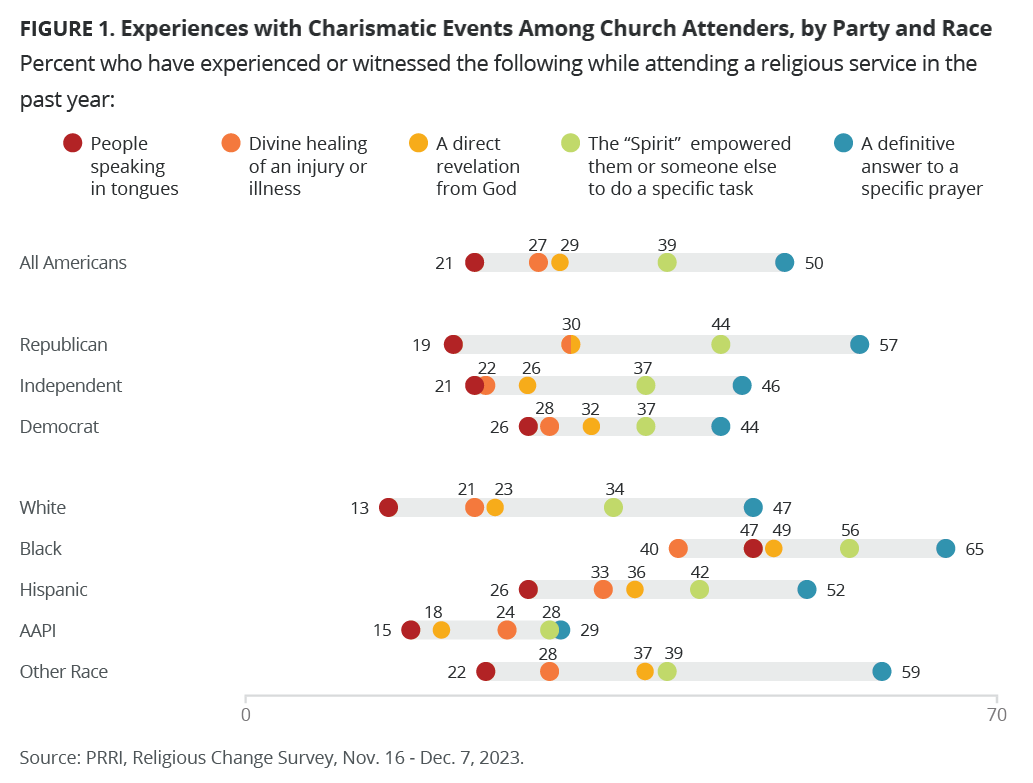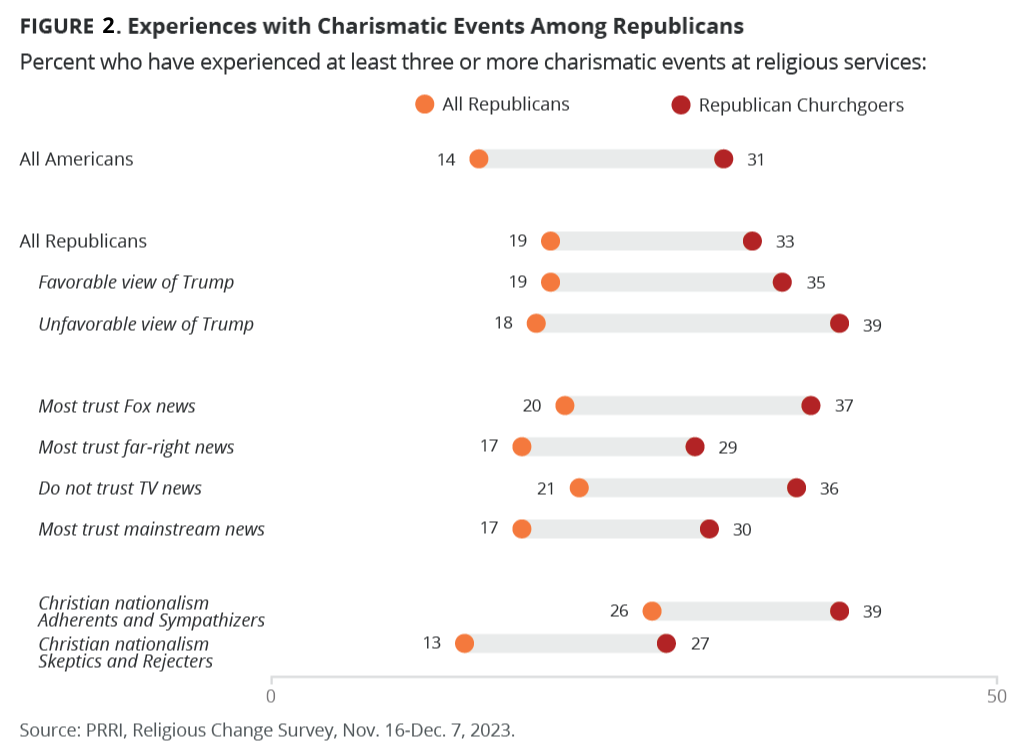How Charismatic and Pentecostal Conservatives Are Shaping the American Right Wing of Today

Leah Payne, Ph.D., is an associate professor of religious history at Portland Seminary in Oregon and a 2023-2024 PRRI Public Fellow. She studies the influence of charismatic and Pentecostal Christianity on American politics.
Sean Feucht, a charismatic Christian worship leader, musician, right-wing activist, and self-identified “Christian nationalist,” gained national attention this past spring for holding several “pro-Israeli” marches at several campuses rocked by protests over Israel’s handling of the war in Gaza. For a growing number of right-wing charismatics and Pentecostals like Feucht, American politics is secondary to the nation they believe is ordained by God to usher in the Second Coming of Christ: Israel.
While Pentecostal and charismatic Christianities are young religious movements, and relatively new players in the American right wing, PRRI’s recent Religious Change in America survey found that Pentecostal and charismatic Christians now make up a significant portion of American churchgoers. When asked about hallmark charismatic and Pentecostal beliefs and practices, half of American churchgoers said that they had received a definitive answer to a specific prayer, 39% said that the “Spirit” had empowered them or someone else to do a specific task, 29% said they had received a direct revelation from God, and 27% reported witnessing divine healing of an injury or illness.

A New, More Diverse Generation Takes Hold
Charismatic and Pentecostal Christianities are transnational and their U.S. practitioners are extraordinarily diverse in terms of race, ethnicity, and partisan affiliation, and – demographically speaking – they represent the future of American evangelical Christianity. Polling conducted in 2023 with support from PRRI shows that while evangelical Protestants are in decline and generational replacement is in doubt, charismatic “born again” or “evangelical” worshipers are younger and more racially diverse than their non-charismatic counterparts.
As a result of this growth, charismatics and Pentecostals are making their presence known — and spreading their beliefs — in conservative political spaces. Activists like Sean Feucht, who is linked to the New Apostolic Reformation (NAR), infuse their political activism and Christian nationalism with Pentecostal and charismatic concepts of spiritual warfare, prophecy, prosperity, dominion, and Zionism.
Though many of the public figures associated with the NAR hail from relatively elite, white-dominant celebrity circles, and are often dismissed as “fringe,” PRRI data shows that Republican Christian nationalists are now more likely than non-Christian nationalist Republicans to experience charismatic and Pentecostal religious practices.

As these Pentecostal and charismatic communities grow, they are spreading their distinct conviction that the fate of the United States is interwoven with American support for the State of Israel in conservative circles. Drawing on an interpretation of history known technically as premillennial dispensationalism – which uses the Book of Revelation to argue that the nation with the greatest divine importance is Israel – many Pentecostals and charismatics believe that the nations that support Israel are on the side of the king Jesus, who will return to earth at the end of time.
Strong Support for Israel Continues
Zionism based on end-times anticipation, is not new in conservative evangelicalism, but Pentecostal and charismatic demonstrate their fervor with noteworthy creativity and verve. For decades, charismatics and Pentecostals have demonstrated their love for all things Israel with a variety of exuberant appropriations of Jewish rituals including Christianized Seder meals, prayer shawls, shofars, or guided trips to the Holy Land. Perhaps most notably, Pentecostal and charismatic Christians present at the U.S. Capitol on January 6, 2021 appropriated Jewish shofar rituals, linking their attempt to overthrow the democratic processes of the United States government to the end-times restoration of Israel.
Support for the modern state of Israel is durable in these circles. Even as newer forms of charismatic and Pentecostal Christianity, like the New Apostolic Reformation, moved away from premillennial dispensationalism, support for Israel as God’s land remains.
This is noteworthy because many (predominantly, but not exclusively white) charismatic and Pentecostal conservatives do not believe that the United States is exceptional because it is a beacon of democracy or because “God created this nation and created the Constitution,” as former House Majority Leader Tom DeLay said. Rather, many charismatics believe, as Colorado Congresswoman Lauren Boebert stated, “There have been two nations created for God’s glory, Israel and the United States of America.” In this understanding of history, American democracy may come or go; as long as the United States supports Israel, it fulfills its divine purpose of ushering in the Second Coming.
Furthermore, because this form of Pentecostal and charismatic Christian nationalist belief is not built on American exceptionalism, charismatic and Pentecostal notions that any nation can guarantee God’s favor by supporting Israel have gone global via music and media. Indeed, on January 8, 2023, Brazilian President Jair Bolsonaro’s supporters overwhelmed Brazil’s Presidential Palace, Congress, and Supreme Court; stinging from Bolsonaro’s loss, his supporters, much like Trump’s followers, stormed Brazil’s capital in what Raimundo Barreto and João B. Chaves called the “twin insurrection.” When Bolsonaro’s spouse, charismatic Christian Michelle Bolsonaro, voted for her husband, she wore a t-shirt emblazoned, not with the Brazilian flag, but the Israeli flag to cast her vote for her husband and captioned her Instagram photo “May God’s blessings be upon Brazil and Israel.”
In the U.S., support for Israel has shaped Pentecostal and charismatic voting preferences in recent elections. In the 2020 election, white Pentecostal and charismatic Christians provided former President Donald J. Trump with overwhelming, enthusiastic support, in part because of his much-publicized decision to move the American embassy from Tel Aviv to Jerusalem, which they interpreted as a step toward the return of Jesus.
Ahead of the 2024 election, the Israel-Hamas war has only increased Pentecostal and charismatic Zionism and staunch Trump supporters like Paula White-Cain, Sean Feucht, and Lance Wallnau have shown enthusiastic support for Israel. In contrast with Cold War Christian conservatives of the past, who saw the U.S. as a special envoy of democracy, many charismatic and Pentecostal conservatives now see the United States as a key end-times actor, regardless of whether or not democracy flourishes in the future.

